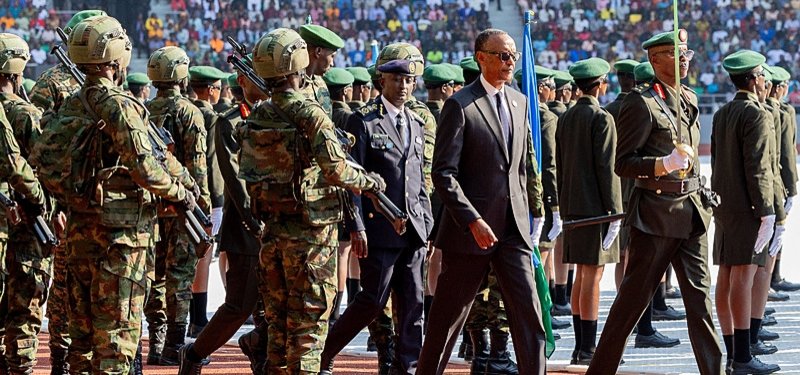
Paul Kagame sworn-in for fourth term as Rwanda's president
On Sunday, Paul Kagame took the oath of office for his next five-year term as president of Rwanda, following his resounding election triumph last month. He committed to staying true to the nation, upholding its Constitution and regulations, safeguarding peace and sovereignty, and solidifying unity among its people.
- World
- Anadolu Agency
- Published Date: 08:36 | 11 August 2024
- Modified Date: 08:36 | 11 August 2024
Paul Kagame was sworn in Sunday for another five-year term as Rwanda's president after winning a landslide election victory last month.
The East African nation's Chief Justice Faustin Nteziryayo administered the oath at the ceremony attended by several African leaders at a packed Amahoro Stadium in the capital Kigali.
Kagame pledged to remain loyal to the country, defend its Constitution and laws, preserve peace and national sovereignty, and to consolidate national unity.
Kagame, who ran under the banner of the ruling Rwandan Patriotic Front (RPF) in the election on July 15, won with more than 99% of the vote.
He beat his challengers Frank Habineza of the opposition Democratic Green Party of Rwanda and independent candidate Philippe Mpayimana. Both collectively received less than 1% — 0.53% and 0.32%, respectively.
The electoral body reported a voter turnout rate of 98% among the approximately 9 million eligible voters.
In his inaugural speech, Kagame highlighted the role of the country's spirit of unity in his election win.
"Our political process is designed to renew and deepen our unity," he said.
Kagame, 66, sought reelection following a 2015 constitutional amendment that allowed him to run for three more terms and gave him the green light to pursue a seven-year third term in 2017.
However, the amended Constitution shortened presidential term limits to five years starting in 2024.
Kagame grew up in Uganda as a refugee following the country's 1959-1962 revolution, which led to the Tutsi population being driven out by the majority Hutu.
He was a founding member of current Ugandan President Yoweri Museveni's rebel army in 1979, where he headed its intelligence wing, helping Museveni seize power in 1986. Kagame received military training in Uganda, Tanzania, and the US.
Rwanda experienced a civil war in 1990-1994 due to deep ethnic divisions between the Hutu and Tutsi.
The climax of the war, the 1994 genocide against the Tutsi, killed about 1 million Tutsis and moderate Hutus.
Kagame is credited with leading the Rwandan Patriotic Army (RPA), the armed wing of the RPF, to help stop the 100-day genocide and foster unity and peace in its aftermath.
He served as vice president and defense minister before becoming president in 2000 and has since won subsequent elections, including the 2017 election with over 98% of the vote.
- 'No impact reported' from Ukraine nuclear plant fire: IAEA
- Iranian Vice President Javad Zarif steps down after ministerial nominations for new government
- Zelensky: Russian strikes from Kursk region deserved fair response
- Hamas tells Gaza mediators to implement Biden truce plan instead of 'more talks'
- Biden: Gaza ceasefire 'possible' before his term ends

